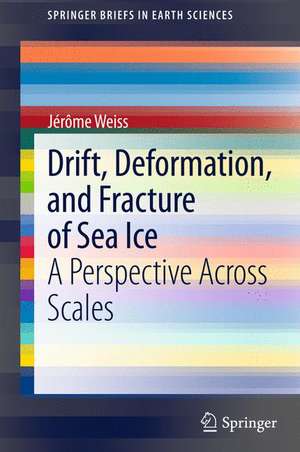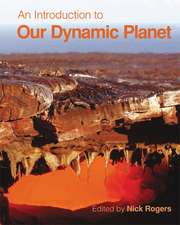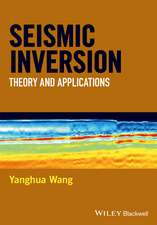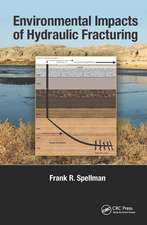Drift, Deformation, and Fracture of Sea Ice: A Perspective Across Scales: SpringerBriefs in Earth Sciences
Autor Jerome Weissen Limba Engleză Paperback – 19 mar 2013
Din seria SpringerBriefs in Earth Sciences
-
 Preț: 380.25 lei
Preț: 380.25 lei -
 Preț: 378.12 lei
Preț: 378.12 lei -
 Preț: 290.09 lei
Preț: 290.09 lei -
 Preț: 477.72 lei
Preț: 477.72 lei -
 Preț: 381.98 lei
Preț: 381.98 lei -
 Preț: 355.07 lei
Preț: 355.07 lei -
 Preț: 355.37 lei
Preț: 355.37 lei -
 Preț: 351.90 lei
Preț: 351.90 lei -
 Preț: 381.21 lei
Preț: 381.21 lei -
 Preț: 377.35 lei
Preț: 377.35 lei -
 Preț: 342.44 lei
Preț: 342.44 lei -
 Preț: 343.98 lei
Preț: 343.98 lei - 20%
 Preț: 389.08 lei
Preț: 389.08 lei -
 Preț: 378.92 lei
Preț: 378.92 lei -
 Preț: 375.62 lei
Preț: 375.62 lei -
 Preț: 379.68 lei
Preț: 379.68 lei -
 Preț: 378.12 lei
Preț: 378.12 lei -
 Preț: 377.18 lei
Preț: 377.18 lei -
 Preț: 443.75 lei
Preț: 443.75 lei -
 Preț: 378.54 lei
Preț: 378.54 lei -
 Preț: 380.07 lei
Preț: 380.07 lei -
 Preț: 376.96 lei
Preț: 376.96 lei -
 Preț: 379.09 lei
Preț: 379.09 lei - 15%
 Preț: 464.18 lei
Preț: 464.18 lei -
 Preț: 376.96 lei
Preț: 376.96 lei -
 Preț: 348.01 lei
Preț: 348.01 lei -
 Preț: 379.48 lei
Preț: 379.48 lei -
 Preț: 375.07 lei
Preț: 375.07 lei -
 Preț: 477.94 lei
Preț: 477.94 lei -
 Preț: 376.22 lei
Preț: 376.22 lei -
 Preț: 349.41 lei
Preț: 349.41 lei -
 Preț: 381.00 lei
Preț: 381.00 lei - 15%
 Preț: 463.35 lei
Preț: 463.35 lei -
 Preț: 376.22 lei
Preț: 376.22 lei -
 Preț: 376.96 lei
Preț: 376.96 lei -
 Preț: 446.47 lei
Preț: 446.47 lei -
 Preț: 346.62 lei
Preț: 346.62 lei -
 Preț: 379.68 lei
Preț: 379.68 lei -
 Preț: 373.32 lei
Preț: 373.32 lei -
 Preț: 377.95 lei
Preț: 377.95 lei -
 Preț: 377.57 lei
Preț: 377.57 lei -
 Preț: 390.83 lei
Preț: 390.83 lei -
 Preț: 375.45 lei
Preț: 375.45 lei -
 Preț: 377.73 lei
Preț: 377.73 lei -
 Preț: 376.04 lei
Preț: 376.04 lei -
 Preț: 379.09 lei
Preț: 379.09 lei
Preț: 377.18 lei
Nou
Puncte Express: 566
Preț estimativ în valută:
72.20€ • 78.45$ • 60.68£
72.20€ • 78.45$ • 60.68£
Carte tipărită la comandă
Livrare economică 21 aprilie-05 mai
Preluare comenzi: 021 569.72.76
Specificații
ISBN-13: 9789400762015
ISBN-10: 9400762011
Pagini: 90
Ilustrații: XVI, 83 p. 34 illus., 19 illus. in color.
Dimensiuni: 155 x 235 x 15 mm
Greutate: 0.16 kg
Ediția:2013
Editura: SPRINGER NETHERLANDS
Colecția Springer
Seria SpringerBriefs in Earth Sciences
Locul publicării:Dordrecht, Netherlands
ISBN-10: 9400762011
Pagini: 90
Ilustrații: XVI, 83 p. 34 illus., 19 illus. in color.
Dimensiuni: 155 x 235 x 15 mm
Greutate: 0.16 kg
Ediția:2013
Editura: SPRINGER NETHERLANDS
Colecția Springer
Seria SpringerBriefs in Earth Sciences
Locul publicării:Dordrecht, Netherlands
Public țintă
ResearchCuprins
Sea ice drift.- Sea ice deformation.- Sea ice fracturing.- Recent evolution of sea ice kinematics and rheology.- Modeling of sea ice rheology and deformation.
Notă biografică
Jérôme Weiss completed his PhD in Material Science at the Ecole des Mines of Paris in 1992. He is CNRS senior scientist in the Laboratory of Glaciology and Geophysics of the Environment in Grenoble, where he led the Ice Mechanics group until 2009. His research interests cover the mechanics of geophysical objects, from the scale of lattice defects (dislocations, microcracks) to large geophysical scales. He is therefore particularly interested in scaling properties of mechanical-related variables. During the last decade, he particularly focused on the Arctic sea ice cover, its mechanical behavior, drift, and deformation, as well as its role on climate change. He has published about 85 scientific papers, including 7 solicited reviews and 6 general public articles.
Textul de pe ultima copertă
Sea ice is a major component of polar environments, especially in the Arctic where it covers the entire Arctic Ocean during most of the year. However, in a context of climate change, the Arctic sea ice cover has been declining significantly over the last decades, either in terms of concentration or thickness. The sea ice cover evolution and climate change are strongly coupled through the albedo positive feedback, thus possibly explaining the Arctic amplification of climate warming. In addition to thermodynamics, sea ice kinematics (drift, deformation) appears as an essential player in the evolution of the ice cover through a reduction of the average ice age (and so of thickness), or ice export out of the Arctic. This is a first motivation for a better understanding of kinematical and mechanical processes of sea ice. A more upstream, theoretical motivation is a better understanding of brittle deformation of geophysical objects across a wide range of scales. Indeed, owing to its very strong kinematics, compared e.g. to the Earth’s crust, an unrivaled kinematical dataset is available for sea ice from in-situ (e.g. drifting buoys) or satellite observations. Here we review recent advances on the understanding of sea ice drift, deformation and fracturing obtained from these data. We particularly focus on the scaling properties in time and scale that characterize these processes, and we emphasize the analogies that can be drawn with the deformation of the Earth’s crust. These scaling properties, which are the signature of long-range elastic interactions within the cover, constrain future developments in the modeling of sea ice mechanics. We also show that kinematical and rheological variables such as average velocity, average strain-rate or strength have significantly changed over the last decades, accompanying and actually strengthening the Arctic sea ice decline.
Caracteristici
Includes supplementary material: sn.pub/extras










